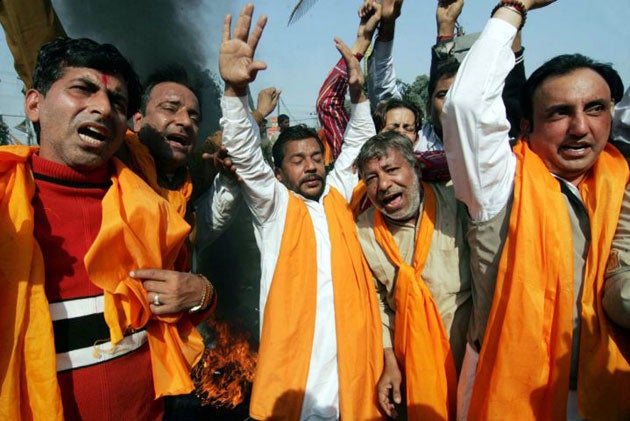Terrorist outlaws – or a group with friends in high places?

Your support helps us to tell the story
From reproductive rights to climate change to Big Tech, The Independent is on the ground when the story is developing. Whether it's investigating the financials of Elon Musk's pro-Trump PAC or producing our latest documentary, 'The A Word', which shines a light on the American women fighting for reproductive rights, we know how important it is to parse out the facts from the messaging.
At such a critical moment in US history, we need reporters on the ground. Your donation allows us to keep sending journalists to speak to both sides of the story.
The Independent is trusted by Americans across the entire political spectrum. And unlike many other quality news outlets, we choose not to lock Americans out of our reporting and analysis with paywalls. We believe quality journalism should be available to everyone, paid for by those who can afford it.
Your support makes all the difference.The prime suspect for the attack on Mumbai, Lashkar-e-Toiba, is the biggest and most violent of the Islamist groups fighting against India for a separate Kashmir. It has also, over the years, built up close links with al-Qa'ida and ISI, the Pakistani intelligence service.
It is Lashkar's policy of bombings and shootings within India as well as Kashmir that has brought Pakistan and India, two nuclear-armed powers, to the brink of conflict in recent years. The link to the ISI, often described as a state-within-a-state in Pakistan, may again shift relations between India and Pakistan to incendiary levels if evidence is uncovered that the intelligence organisation was involved in the attack.
Delhi has repeatedly accused Islamabad of actively colluding in the group's attacks and threatened retribution. The Pakistanis deny the charge and point out that the organisation is banned in the country.
The Pakistani defence, analysts point out, is disingenuous. It is indeed the case that the group was officially outlawed by Pervez Musharraf under American pressure in 2002 after a series of bombings in Delhi. However, Lashkar simply continued under the new name of Jama'at-ud-Da'wah. What appears to be the case is that even the country's military regime had little control over a client organisation of the ISI, and the fundamentalists in the armed forces hierarchy and the current civilian government is far more impotent to curb the militants that the Pakistani state had once had a part in creating.
Lashkar, and similar groups, receive funding as well as recruits from the Kashmiri, and broad Pakistani community. One of its more infamous recruits was Rashid Rauf, who was wanted in connection with the plot to blow up transatlantic airliners and was recently reported to have been killed in an American air strike in North Waziristan. Some of the funds donated by the wider Western public, and, ironically India, following the earthquakes of three years ago were siphoned into Lashkar funds. It is also the beneficiary, according to Pakistani and Western analysts, of large scale funding from the ISI.
Lashkar maintains close relationship with al-Qa'ida and other jihadist organisations. Some of its fighters were killed in an al-Qa'ida camp when Bill Clinton ordered missile strikes against Osama bin Laden following the bombing of the US embassy in the Kenyan capital. The organisation's camp at Muridke near Lahore, was used as a hideout by two senior al-Qa'ida operatives, Ramzi Yousef and Mir Aimal Kansi.
Although the organisation's chief aim is to drive Indian forces out of Kashmir, it was originally founded in 1991 by Hafiz Muhammad Saeed in the Kunar province of Afghanistan to fight against the then Marxist government in Kabul. It has sent members to fight alongside the Taliban in Afghanistan. In return, Pakistani, as well as Arab and Chechen fighters, were among Lashkar forces sent into Kashmir against Indian forces.
Hafiz Muhammad Saeed remains its spiritual leader with Maulana Abdul Wahid Kashmiri its military commander. The group calls for the destruction of India and Israel, and also has the professed aim of introducing Islam wherever there had been a significant Muslim population any time in history, including Spain, Russia and China. Lashkar also advocates the establishment of Sharia law and the Muslim "universal ummah" within Muslim communities in the West including the UK.
It is, however, Kashmir and India which have been the scene of most its activity, with some of its operations inside India conducted with home-grown Islamist groups such the Indian Mujaheddin. The group has been accused of mass killings of Sikhs and Hindus in Kashmir; the bombings at Delhi markets which killed 60 people, the deaths of 90 people in explosions at the Hindu pilgrim city of Benares, 211 more in blasts on commuter trains in Mumbai, and the attack on parliament in Delhi in 2001 which brought India and Pakistan to the brink of war in 2001.
Join our commenting forum
Join thought-provoking conversations, follow other Independent readers and see their replies
Comments